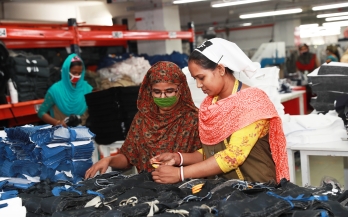

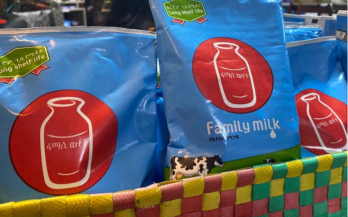
GAIN Discussion Paper n°18: Milk: Objections and Support- A Clarification Of The Evidence For Donors, Implementers, And Policymakers In Low- And Lower-Middle Income Countries
- 23/04/2025
Milk is a commonly consumed food in Low- and Lower-Middle Income Countries (LLMICS). It contains many important nutrients and generally appears, together with its derived products, in national dietary guidelines. But objections have been raised to its promotion on several grounds: health, environmental, animal welfare, and affordability. This Discussion Paper reviews commonly presented arguments in favour of and against consumption of dairy, taking into account the specific contexts of LLMICs.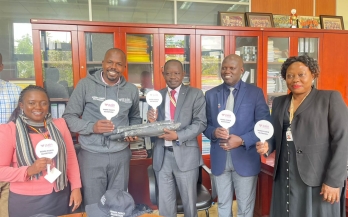
From Presentation to Partnership, Our Journey with Uganda’s office of the Prime Minister
A single presentation about workforce nutrition became the catalyst for a transformative partnership with Uganda’s office of the prime minister (OPM). When we first introduced the four pillars of workforce nutrition i.e. nutrition education, healthy food at work, breastfeeding support, and nutrition focused health checks, we could not have anticipated the impact it would have on the officials present. Their response was immediate and enthusiastic “This is exactly what we have been missing”.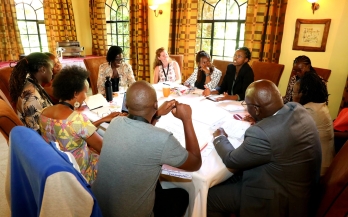
Cultivating Diversity: Kenya’s Bold Vision for Resilient Food Systems
Imagine a Kenya where vibrant urban markets overflow with indigenous greens, youth in peri-urban areas lead Agri-tech startups, and rural cooperatives thrive as they steward regenerative farming methods. This future was at the heart of a recent co-creation workshop in Kenya, uniting 35 food system leaders from Ministry of Agriculture, Glocolearning, Food and Agriculture Organization (FAO), SUN CSA and GAIN to chart pathways toward food systems diversification. Diversification has been widely identified as a strategy with great potential to build better resilience, nutrition, and equity across Kenya.
The Food Systems Countdown Initiative Webinar
- Global
This webinar will introduce participants to the Food Systems Countdown Initiative and present the 2024 report tracking global progress on the Countdown's 50 indicators and examining interactions across indicators. The webinar will highlight how participants can use the Food Systems Dashboard to explore the Countdown's indicators. Participants will also hear from country stakeholders on the impacts of the Countdown and Dashboard and how they can help guide action.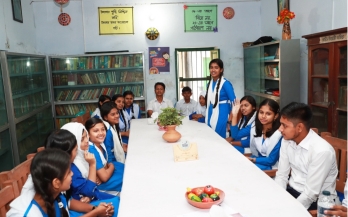
GAIN Working Paper n°50: MEASURING YOUTH ENGAGEMENT IN POLICY PROCESSES
- 10/04/2025
While there is a growing recognition of the importance of youth engagement in food system decision-making and governance, existing research remains largely theoretical or anecdotal, with a scarcity of empirical studies providing robust data on the engagement and meaningful participation of young people in food systems. A first step towards providing such data is having strong, validated metrics and data-collection methods that can be applied comparably across contexts. This scoping review thus synthesises evidence on metrics and methods used to assess youth engagement in policy processes, with a specific focus on food system-related policies.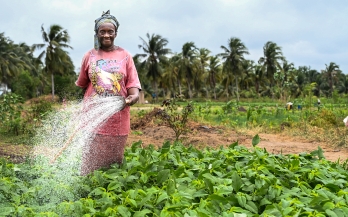
GAIN 2025 Nutrition for Growth (N4G) Commitments
From March 27 to 28, 2025, The Government of France hosted the 2025 Nutrition for Growth (N4G) Summit in Paris. The N4G Summit is an international conference dedicated to defeating all forms of malnutrition by bringing together governments, international organisations, philanthropies, businesses, NGOs and other key stakeholders. Its objectives are to elevate nutrition as a key priority on the global development agenda and secure concrete political and financial commitments to accelerate progress against malnutrition. In alignment with its mission to enhance nutrition outcomes by improving the consumption of nutritious and safe food for all people, GAIN registered two new commitments under the Nutrition Accountability Framework (NAF) to ensure accountability in achieving its objectives. These commitments build upon those that GAIN initially registered at the 2021 Tokyo N4G Summit.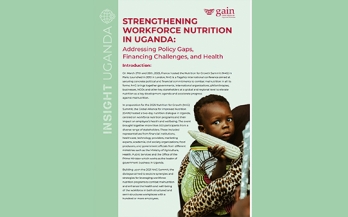
Strengthening Workforce Nutrition In Uganda: Addressing Policy Gaps, Financing Challenges, and Health
- 09/04/2025
On March 27th and 28th, 2025, France hosted the Nutrition for Growth Summit (N4G) in Paris. Launched in 2013 in London, N4G is a flagship international conference aimed at securing concrete political and financial commitments to combat malnutrition in all its forms. N4G brings together governments, international organisations, philanthropies, businesses, NGOs and other key stakeholders at a global and regional level to elevate nutrition as a key development agenda and accelerate progress against malnutrition. In preparation for the 2025 Nutrition for Growth (N4G) Summit, the Global Alliance for Improved Nutrition (GAIN) hosted a two-day nutrition dialogue in Uganda, centred on workforce nutrition programs and their impact on employee’s health and wellbeing.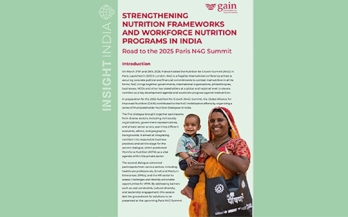
Strengthening Nutrition Frameworks and Workforce Nutrition Programs In India
- 09/04/2025
On March 27th and 28th, 2025, France hosted the Nutrition for Growth Summit (N4G) in Paris. Launched in 2013 in London, N4G is a flagship international conference aimed at securing concrete political and financial commitments to combat malnutrition in all its forms. N4G brings together governments, international organisations, philanthropies, businesses, NGOs and other key stakeholders at a global and regional level to elevate nutrition as a key development agenda and accelerate progress against malnutrition.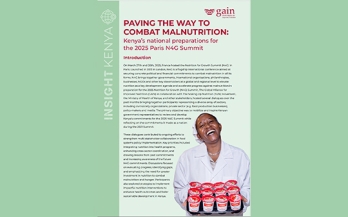
Paving The Way To Combat Malnutrition: Kenya’s National Preparations For The 2025 Paris N4G Summit
- 09/04/2025
On March 27th and 28th, 2025, France hosted the Nutrition for Growth Summit (N4G) in Paris. Launched in 2013 in London, N4G is a flagship international conference aimed at securing concrete political and financial commitments to combat malnutrition in all its forms. N4G brings together governments, international organisations, philanthropies, businesses, NGOs and other key stakeholders at a global and regional level to elevate nutrition as a key development agenda and accelerate progress against malnutrition.In preparation for the 2025 Nutrition for Growth (N4G) Summit, The Global Alliance for Improved Nutrition (GAIN) in collaboration with The Scaling Up Nutrition (SUN) Movement, the Ministry of Health of Kenya, and other stakeholders, hosted several dialogues over the past months bringing together participants representing a diverse array of sectors, including civil society organizations, private sector (e.g. food production businesses), policy-makers and media. The primary objective was to mobilize and inspire Kenyan government representatives to review and develop Kenya's commitments for the 2025 N4G Summit while reflecting on the commitments it made as a nation during the 2021 Summit.